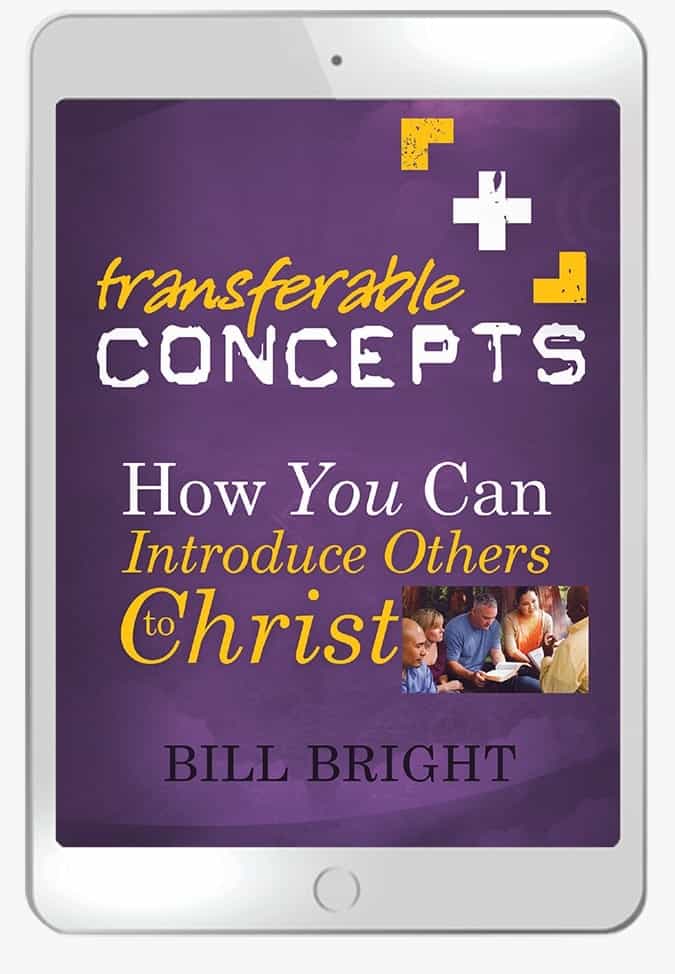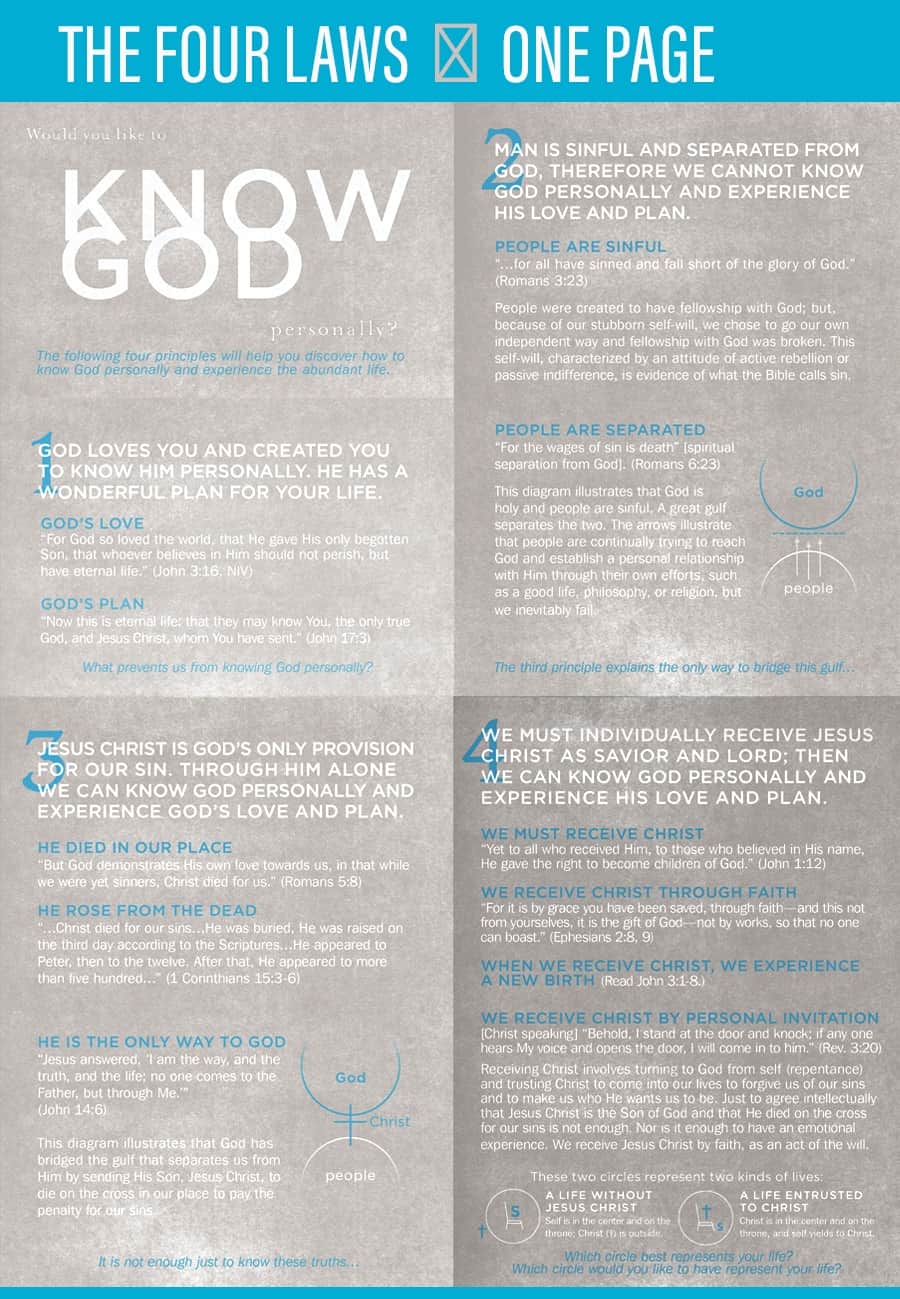Personal Evangelism 101: The Complete Guide

Personal evangelism is sharing the message of Jesus Christ with others. It is showing and telling — with both word and deed — who Jesus is and how it's possible to have a relationship with Him. Think of evangelism in light of life's journeys. Personal evangelism is simply the privilege of entering into the spiritual journey of another person, discovering how God is at work and the role that we can play.
It sounds so simple in theory. So why does it seem so hard?
If you are like most motivated Christians, you genuinely desire to share about your faith in Jesus, but the thought of it may excite and terrify you. Why?
The desire to share one’s faith is a natural overflow of one’s relationship with Christ. A person in love rarely stops thinking and talking about the object of their affection. A person who has genuinely experienced Jesus Christ expresses a similar compulsion (Acts 4:20).
Sadly, personal evangelism is not just a process of explaining truth until another person understands and then automatically makes the choice to believe in Jesus. People have all sorts of barriers or obstacles to overcome before they accept the truth about God. God is more than a series of concepts to either agree or disagree with. He is real, He is alive; and He has said the one way a relationship with Him can work is by trusting Him to be our ultimate authority.
So it’s not surprising that people, self-protective and independent, often resist the truth about God.
But people who do not yet believe in God are only half of why personal evangelism is complicated. If you are a Christian with a desire to share what you believe with someone else, you have to choose to take a step of faith. You cannot know how the person you’re talking to will react or how it might change your relationship with them. Fear, anxiety and nervousness are very normal as you learn how to make personal evangelism part of your everyday life.
Learn. That’s the crucial word in this situation. If you are willing to learn how to share your faith and willing to trust God with the outcomes, then you’re ready to begin.
Here are a few steps you can take to make personal evangelism feel more achievable in your life.
If you're in a hurry, here are some shortcuts to specific sections of content:Preparing Well for Personal Evangelism

Becoming effective at personal evangelism begins with preparing well.
You have to learn the foundations and basics of talking to other people about God in order to become confident doing it. This is true of any new skill. The encouraging truth is that God gives us everything we need to succeed.
But what does it mean to succeed in personal evangelism? Bill Bright, the co-founder of Cru, put it well. He said success in evangelism is simply “taking the initiative to share Christ in the power of the Holy Spirit and leaving the results to God.”
Here are some things to focus on as you prepare to share your faith in Jesus Christ.
Pray for the People God Places in Your Life
There is no better place to begin than in prayer. Evangelism is first and foremost a work of God. God is already at work in the lives of others and He wants to use you. God wants to work through you, not just around you.
The reality is that you do not and cannot bring others to faith in Jesus Christ. God does that through His Holy Spirit. But He does want us to be part of the incredible journey someone goes on as they move toward Him.
Jesus wants you to pray about how you can be involved in His work from passages like this:
When [Jesus] saw the crowds, He had compassion on them, because they were harassed and helpless, like sheep without a shepherd. Then He said to His disciples, “The harvest is plentiful but the workers are few. Ask the Lord of the harvest, therefore, to send out workers into His harvest field.” (Matthew 9:36-38, New International Version)

Search your heart. Do you have compassion for your friends, family members, and co-workers who do not yet have a relationship with God? Pray that God would give you compassion and empathy for them. You can also pray that God sends someone to tell them about Jesus. Often, that “someone” will turn out to be you.
Become Curious About Others
Everyone has a story and every story is worth hearing. That becomes the basis of curiosity. Before you can help someone in their spiritual journey, you have to discover where they are. This comes through listening and asking good questions. Listening with genuine interest communicates care and builds trust.
Are there people you feel you know well and whom you are allowing to know you well? If the answer is yes but these people do not share your beliefs about God, you already have a great foundation for starting that conversation. If people trust you, they are more willing to enter into conversations like this. If they do not trust you, why would they trust what you tell them is true?
How do you develop and deepen someone’s trust in you? Ask questions that demonstrate that you care about them and that you are curious about what they think and believe.
Give yourself a goal of asking five people a week one new question. Get to know their real life, not just their spiritual beliefs. Find out how they are doing. Learn about their families and friends.
Is this sharing the message of Jesus with someone? Not yet. But it is an essential part of personal evangelism.
Beginning to trust a Christian can be an essential stepping stone in someone’s journey to faith in Jesus.
Everyone wants to feel connected. If you become the person others think of as interested in them, they will also see you as a safe person to have deeper conversations with.
Identify Your Pond: Your Area of Focus
God has you in a unique place for a unique time. He desires that you represent Him where you are: at work, at home and wherever you relax.
What are the places where you cross paths with the same people regularly? Think of your neighborhood, your gym, your favorite coffee shop, your book club, your family, your friends.
Make a list of the people in these places you want to have a spiritual conversation with, then pray and ask God where to focus first.
Your Personal Testimony Is Your Best Friend
After listening to another person's story, it often is natural and effective to share a little bit of our own. Your personal testimony is a great tool to help you become more confident in talking about what you believe. It’s your story. It’s not a series of theological ideas you might worry about not explaining clearly. It is sharing your experience of coming to believe in God and have a relationship with Him.
Some people become Christians because they work through a series of rational arguments for believing or not believing in God until they come to a conclusion. But many people need to hear a story like yours so they can imagine what a life lived with God can look like.
Your story is a powerful way to help people see the real difference knowing God makes in someone’s life. Your experience, and your story, is likely to include many of the doubts, questions and challenges of life that the person listening to you will resonate with.
Throughout your life, you will have friends and family who will experience pain and suffering. Being ready to say, “I’ve experienced something similar. This is how I have found hope in the midst of pain,” can bring the message of Jesus to life in a way they might not have experienced before.
Here are some simple steps for preparing your story:
- Take time to prepare your personal testimony using this template.
- Write it out and practice telling it with some trusted friends. Invite their feedback.
- Pray that God would give you an opportunity to use it in an everyday conversation with someone from one of your ponds.
These steps are a framework to prepare well for personal evangelism. The more you prepare, the more ready you will feel to take the next step.
Engaging in Personal Evangelism

Once you’ve prepared well, the next step in learning personal evangelism is to practice. Engaging others in evangelism builds your confidence and your faith.
It’s been said that “practice makes perfect,” but God does not expect perfection. He simply wants you to take steps of faith that demonstrate our trust in and dependence upon Him.
Practicing talking about God highlights the areas you are more naturally skilled in and reveals where you need more help from the Holy Spirit and other Christians.
Practice makes talking about Jesus feel more normal and more doable.
It might be helpful for you to think of personal evangelism as occurring in three relational contexts: body mode, natural mode, and initiative mode. These modes simply reflect the reality that different people respond to Christians in different ways. If you want to be confident in sharing your faith with anyone, it’s worth thinking about who that person is and which of these modes they might respond best to and then practicing that best mode with them.
Body Mode: Inviting Someone Into Christian Community
Body mode evangelism is simply inviting someone who does not share your Christian faith to a gathering of Christians. You are giving them an opportunity to experience what is referred to as the body of Christ.
This could be a church service, a small group, a Cru weekly meeting or any event where Christians gather.
You can practice body mode evangelism by inviting someone from one of your ponds to join a church service or worship night. Christmas or Easter services are often a great opportunity to do this, but there is no reason to limit yourself to those special events.
If someone accepts your invitation, ask them afterward what they thought about the event. This is a great way to open the door to further spiritual conversations.
Natural mode: Being intentional with the people in your everyday life
You are naturally connected to certain people in your life. You may have common interests, you may come from the same place, or your kids may go to school together, for example. So, naturally, you’ll want to have conversations with these people about what matters to you, including your faith in God.
When you cross paths with the same people again and again, you have multiple opportunities to move conversations forward gradually.
Choose someone from your area of focus and say something like this:
“I really care about our relationship, and I enjoy getting to know you better. I realized I have never asked you about your spiritual background. Would you be willing to share with me what you and your family believed about God growing up?”
You are offering someone an invitation to a deeper relationship with you by being curious about them. But this will feel like you’re taking a big step of faith. You have no guarantees about how the person will respond.
God knows that, and He wants to use your steps of faith to draw you into deeper relationship with Him as you invite someone else to know Him too.
You need to be okay with someone saying they would rather not talk about that. Be patient, continue building the relationship, and ask God to give you another opportunity with that person.
Initiative mode: Starting conversations about God with someone you do not know
This is a great way to talk about God with the people in your everyday life. All you need to do is ask a few spiritual questions, listen, make sure you understand, then respond when appropriate.
For example, you might say: “I am learning how to become a better listener. Could I ask you a few questions about life and spirituality?”
One thing you might struggle with at first is knowing how to turn a conversation towards spiritual topics in a way that does not feel awkward or forced.
To practice transitioning conversations to spiritual topics, consider using one of these 99 wondering questions.
You can also use the sometime question. Simply ask, “I would love to hear more about what you believe about God. Could we get together sometime and talk about our spiritual backgrounds?”
If they say yes, you can reply, “Great! Is there a certain day or time that might work for you?”
Throwing in the word “sometime” gives the other person an out in case they do not want to talk about God.
If you are ready to share the gospel with someone from one of your ponds but you want a simple way to walk someone through explanations of the gospel message, try using the GodTools app, which is designed to help you with personal evangelism.
Once you feel comfortable with the tools, try asking a friend or loved one the “sometime” question. Then ask a few spiritual questions and see what happens.
It’s really important to remember that however well or poorly you think things are going with spiritual conversations, the Holy Spirit is working in the hearts of the people you talk to, helping them understand the truth and how to move toward God.
Top Tips for Personal Evangelism

Now that you know how to prepare for personal evangelism and how to practice personal evangelism, here are some simple tips to take with you.
1. Be Filled With, Empowered by and Directed by the Holy Spirit
This is the most important thing you need to know. You cannot share the good news about Jesus in your own strength. God does not intend you to.
Successful evangelism is taking the initiative in the power of the Holy Spirit and leaving the results to God. This is freeing! The results do not depend on how well you share the gospel or how well you ask spiritual questions.
Only God truly changes people’s hearts. What you can do is express your need for the Holy Spirit to work in and through you before you begin a spiritual conversation with someone. He will guide the conversation.
2. Live in Faith, Not Fear
“The Spirit God gave us does not make us timid, but gives us power, love and self-discipline” (2 Timothy 1:7, NIV).
Praise God that this is true. God did not give us a spirit of fear. Believe God wants to use you to make a difference with the people in your life, then take a step of faith with someone. If you trust God more than you fear other people or your own perceived inadequacy, you will see Him work and know you are part of what He’s doing.
God cares about the people in your life who do not yet know Him. He wants to have a relationship with them. Ask God how He wants to use you on someone else’s spiritual journey. You can strengthen your own faith by praying daily for God to move in the lives of others. As you see Him answer those prayers, you will trust Him to help you take your next step of faith.
3. Treat People the Way You Want To Be Treated
This simple guideline helps as you initiate spiritual conversations with anyone. If you would appreciate someone being polite (not pushy) and listening well, then be polite to others and listen to them. If you enjoy meeting someone who is genuinely curious about you, practice being curious about others.
The same is true for what to avoid. No one likes being yelled at, talked down to or steamrolled in a conversation. No one likes being told that everything they think or believe is wrong. All of these things will turn someone off to Jesus.
It is natural and appropriate for you to gently knock, asking permission with a question like, “Can I share a little bit of my story?” Or, maybe better, “Can I share a little bit of my experience?” Asking permission opens the door without forcing your story into the conversation. It also communicates respect to the other person, continuing to foster an open and positive encounter.
Find whatever you can affirm in the way someone sees the world. Connect over that before talking about what you see differently.
Personal evangelism is not something you will ever completely master. Yet stepping into God’s story to reach the world is one of the greatest adventures you could ever have.
God could use anything and anyone to share His message. But He invites us to partner with Him. As you continue looking for new ways to grow, ask for feedback from people you respect and trust God in the process.
Right before Jesus ascended to heaven, He told His disciples, “Surely I am with you always, to the very end of the age” (Matthew 28:20, NIV).
Jesus is with you as you grow in personal evangelism.
Where Do I Go From Here?
If you want to explore this topic more deeply, try reading “Passages: A Devotional Journey” with a friend, and practice applying its daily goals in your life.
Dive deeper into how God has changed your life. These tips will help you better know and communicate your own story.
Cru has several free phone apps to help you have spiritual conversations and talk about Jesus. Check them out here and learn what might be most helpful for you.




















